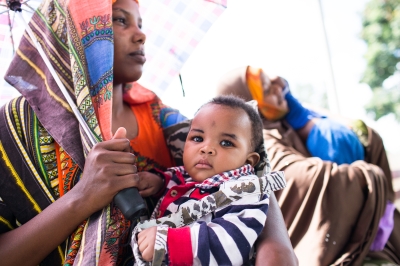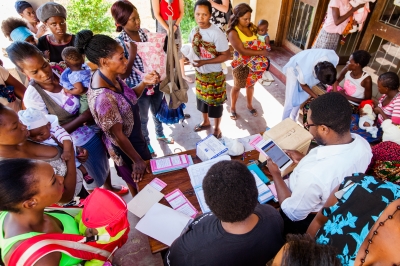The following post was written in partnership with PATH‘s Better Immunization Data (BID) Initiative.

The digital health landscape is rife with disconnected systems that make it challenging to aggregate information and improve the health of populations. After years of disjointed experiences, multiple organizations and governments have found that multi-platform, standardized, and connected information systems are critical to allow health care providers and decision makers access to timely and accurate information.
In this spirit, the International Training and Education Center for Health (I-TECH) joined forces with PATH’s BID Initiative to prevent disease by developing a platform to better trace vaccinations in low-resource settings. As part of its Global Health Security award, I-TECH is localizing the BID Initiative’s Zambia Electronic Immunisation Registry (ZEIR), an app powered by OpenSRP which is an open source mobile health platform, for use in Siaya County, Kenya.
I-TECH reached out to the BID Initiative last summer to hear more about BID’s lessons learned. The two teams began collaborating in earnest last December, leveraging the BID Initiative’s large scope in Zambia and Tanzania with I-TECH’s expertise in working with the OpenMRS platform.
Parallel projects with common goals

In Kenya, I-TECH has been tasked with building an electronic platform to capture immunizations when they happen. The aim of the project—conducted in partnership with the Kenyan Ministry of Health, the CDC Global Health Protection Division, and the CDC Global Immunization Division—is to improve immunization coverage. This is done by tracking and monitoring who is due for which vaccine, starting with population-level coverage within a single county, thus decreasing the chance of outbreaks of vaccine-preventable diseases.
Similarly, the BID Initiative has been working with the Ministry of Health and nurses in Tanzania and Zambia to develop an electronic immunization registry, among other data use tools, to ensure data becomes more accessible and useful to health workers. This, in turn, can help with decision making to prevent vaccine stockouts and enable follow-up with patients who have not returned for needed vaccines. BID’s learnings provided an opportune starting point for I-TECH’s work.
“ZEIR provides all of the workflows we need,” says Craig Appl, I-TECH Senior Technical Advisor for Health Informatics. “It already considers how users will interact with the application. It collects immunization data in a user-friendly manner, allowing health care workers to more accurately administer and record childhood immunizations and to more easily follow-up with children defaulting on their immunization schedule.”
Improvements through open source collaboration
I-TECH and BID have turned to Ona, a social enterprise based in Nairobi, Kenya, committed to fostering change by building information systems infrastructure. BID began working with Ona in January 2017 to adapt the OpenSRP system to Zambia’s national immunization program. This open source development process has been critical to the success of both teams and represents the collective knowledge of a community of developers known as the THRIVE Consortium.
“We simply couldn’t do this if OpenSRP and ZEIR software development was closed source,” says Appl. “The documentation, source code, and community wiki are all open for collaboration. Our team is able to actively track the improvements across the community, receive value where others have built features, and contribute where our projects align. Through open collaboration, we have many more individuals and teams working to improve health outcomes where we work.”
Laurie Werner, BID’s Global Director, agrees, pointing out that each new tool and iteration of the app is more adaptable and affordable than the last. “I-TECH is able to see solutions and propose solutions,” says Werner, “that’s the beauty of open source software.”
Matt Berg, CEO of Ona, views the OpenSRP app created for both projects as a customizable springboard that could potentially accommodate additional modules for antenatal care, malaria data, and maternal and child health.
“From our prior work with BID, we had this great starting point that another country or group could take and adapt and get up and running quickly,” says Berg.
Adaptability equals cost efficiency
Cost is a major driver for any implementation. Until now, it has been more cost efficient to build specific functionality on top of popular generalized information systems and tools, which decreases adaptability. Initial investments in the BID and I-TECH projects have allowed for both flexibility and specificity.
“We tend to focus too much [in the digital health field] on localization, and not on great design,” says Berg. “I think our success in Zambia and Kenya validates the importance of good design…and shows the potential of replicating in places for a fraction of what was originally invested.”
This collaborative environment and focus on adaptable design increases cost efficiency and allows the BID Initiative to fulfill the intention for its solutions to be used in multiple contexts.
“This is the core of the BID Initiative’s theory,” says Werner. “Effective electronic immunization registries have to be adapted to a country’s context and specific needs. Each time you do that, it becomes less and less of a financial investment for future countries.”
This blog post was supported by the Cooperative Agreement Number, U2GH001721, funded by the U.S. Centers for Disease Control and Prevention. Its contents are solely the responsibility of the authors and do not necessarily represent the official views of the Centers for Disease Control and Prevention or the Department of Health and Human Services.

